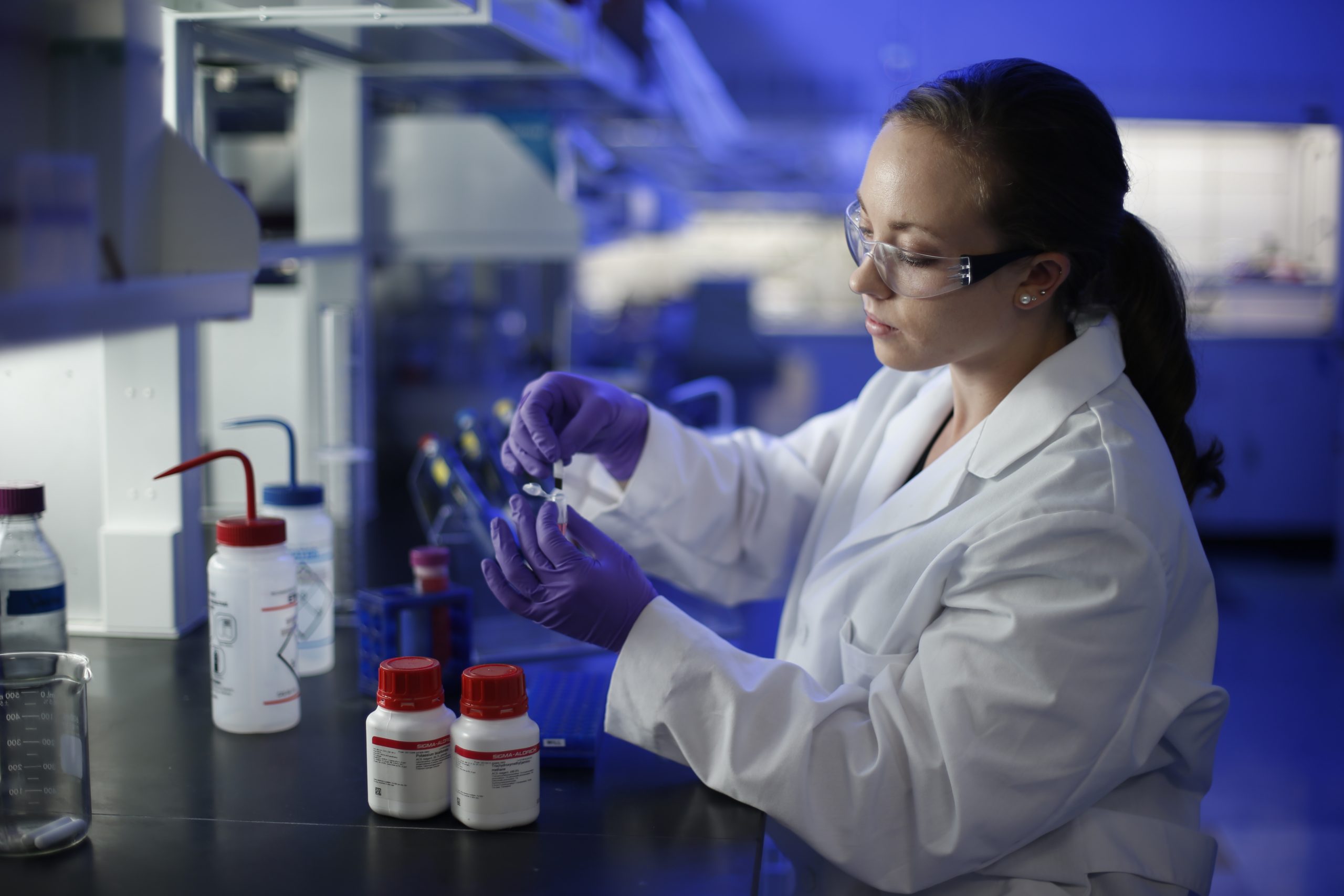Graduate Degree Programs Overview
Graduate work in chemical engineering provides an opportunity for study and research at the cutting edge to contribute to shaping a new model of what chemical engineering is and what chemical engineers do. All faculty members in the Department are active in research and direction of graduate student projects. Additionally, students are provided with numerous professional development activities, including attendance at conferences, professional seminars, career services, teaching supervision for those interested in academic careers, etc.

Program Highlights
Graduate Application Deadlines and Fees
Ph.D. Fall Admission Priority Deadline | December 1, 2025 Application fees will be waived for students enrolled in, or who have graduated from, U.S. schools who apply by the above date. Fee waivers may also be available to applicants from non-U.S. institutions; see the application portal for eligible institutions. |
| Ph.D. Fall Admission | January 8, 2026 |
| M.S. and M.E. Fall Admission | Deadline Extended: March 15, 2026 |
| Fall Admission Offers | Early March 2026 |
| Deadline to Accept Admission | April 15, 2026 |
Doctor of Philosophy
The Ph.D. degree in Chemical Engineering requires 72 semester hours of graduate work, at least 24 of which must be coursework. The following Chemical and Biomolecular Engineering courses are required for the Ph.D. degree.
| Course Number | Course Name | Credit Hours |
| ChBE 6100 | ChE Mathematics | 3 |
| ChBE 6110 | Advanced ChE Thermodynamics | 3 |
| ChBE 6120 | Applied Chemical Kinetics | 3 |
| ChBE 6200 | Transport Phenomena | 3 |
| ChBE 6250 | Special Topics: Professional Development | 1 |
In addition, all students are required to enroll and attend our seminar course (ChBE 8991) every semester in residence.
The schedule below outlines when our core required courses should generally be taken. For highly qualified non-ChBE undergraduates with strong backgrounds in chemistry and mathematics, we also offer a program of courses that, over a two-year period, fills in the student’s knowledge in essential undergraduate chemical engineering courses as well as the core graduate courses. The schedule for students with and without Chemical Engineering undergraduate degrees is shown below.
| ChE BS degree | Non-ChE BS Degree | |
| Fall Yr 1 | ChBE 6100 | ChBE 6100 |
| ChBE 6110 | ChBE 6110 | |
| ChBE 6120 | ChBE 5300 | |
| Spring Yr 1 | Elective | Elective |
| Elective | ChBE 5250 | |
| ChBE 6200 | ChBE 6200 | |
| ChBE 6250 | ChBE 6250 | |
| Fall Yr 2 | Elective | ChBE 6120 |
| non-ChBE Elective | non-ChBE Elective |
For students with Chemical Engineering undergraduate degrees, a minimum of 11 hours of elective courses must be taken. These elective courses should complement the student’s research interests. For students without Chemical Engineering degrees, the courses in italics must be taken in lieu of 6 hours of electives. These classes constitute the minimum courses needed for a non-chemical engineer to have sufficient background to be successful in the ChBE graduate program.
All courses are to be selected with the approval of the student’s dissertation advisor and Continuing Committee. The course load is designed to allow students to spend the majority of their studies on original research; however, course work may extend beyond the 24 required hours on the recommendation of the student’s dissertation advisor and Continuing Committee. Up to 36 hours of graduate course work with an equivalent A or B grade may be transferred to Vanderbilt and applied to the Ph.D. However, no more than 12 hours will be counted toward didactic coursework.
After the first year in residence, students complete a written and oral departmental examination. Admission to candidacy in the Ph.D. program is based upon this examination, as well as the Ph.D. qualifying examination, which consists of written and oral presentation of a proposal for doctoral research.
Following the examinations and at least 72 semester hours of combined course and dissertation research hours, the student prepares and publicly defends a dissertation, which presents results of original research in chemical engineering.
Master of Science
Candidates for the Master of Science must complete 24 semester hours of graduate level courses (12 hours in chemical engineering core courses, 6 hours in a minor field complementary to the research, and 6 hours in chemical engineering and related areas). The candidate's course selection is approved by the thesis advisor. In addition to course work, each degree candidate conducts research under the supervision of a faculty advisor, prepares a written thesis, and presents it orally to the faculty. There is also a non-thesis M.S. option that requires 12 hours in core courses and at least 18 hours of graduate-level elective courses selected from courses in the major or from related areas of interest approved by the Director of Graduate Studies.
The program does not typically provide financial assistance to M.S. students, so applicants will be responsible for providing the funds to support their tuition and living expenses. Graduates holding a B.S. in science, mathematics, and other engineering disciplines must demonstrate sufficient skill and knowledge in problem solving for placement into the core chemical engineering courses. Persons interested in this program should contact the Director of Graduate Studies in Chemical Engineering for more detailed information.
Students are not required to obtain a M.S. degree before applying to the PhD program. Persons interested in obtaining a Ph.D. should apply directly to the Ph.D. program instead.
Master of Engineering
Candidates for the non-thesis Master of Engineering must complete 30 semester hours of graduate level courses (12 hours in chemical engineering core courses, 12 hours of elective coursework, and 6 hours of project work). The program does not require a research thesis. Students who enter with a Chemical Engineering undergraduate degree can typically finish the Master’s program in 2 semesters + 1 summer of full-time study.
Candidates for the Master of Engineering degree must self-fund their tuition and living expenses. Graduates holding a B.S. in science, mathematics, or other engineering disciplines must demonstrate sufficient skill and knowledge in problem solving for placement into the core chemical engineering courses. Persons interested in this program should contact us for more detailed information.
Policies & Forms
Graduate students at Vanderbilt University are governed by the rules and regulations set by the Vanderbilt University Graduate School. These are documented in the Graduate School catalog. The honor code is in effect for all degree candidates in the Graduate Program. All homework and examinations are to be accomplished under the Honor Code rules, unless otherwise specified by the instructor. Violation of the Honor Code will be referred to the Honor Council and can result in the termination of degree candidacy. For a brief overview of student and program expectations, please see Guidelines for Graduate Study in ChBE.
The ChBE Graduate Student Handbook defines the requirements and guidelines for the Chemical and Biomolecular Engineering graduate program. Course requirements are defined as well as some of the procedures you will need to follow to successfully complete your program here at Vanderbilt. In special circumstances the faculty may waive a requirement defined in this handbook. To request a waiver, submit a letter to the Director of the Graduate Program (Jamey D. Young). The letter must clearly indicate what you are requesting to be waived and the reasons for your request.
While we will make every effort to inform students of impending deadlines, it is ultimately each student’s responsibility to see that they submit needed documents as required by the Department and the Graduate School. Students will be responsible for payment of late fees if they miss registration deadlines.
Forms
Contact Us
Jamey Young
Director of Graduate Studies
Cornelius Vanderbilt Professor of Engineering
Professor of Chemical and Biomolecular Engineering
(615) 343-4253
PMB 351604
2301 Vanderbilt Place
Nashville, TN 37235-1604
